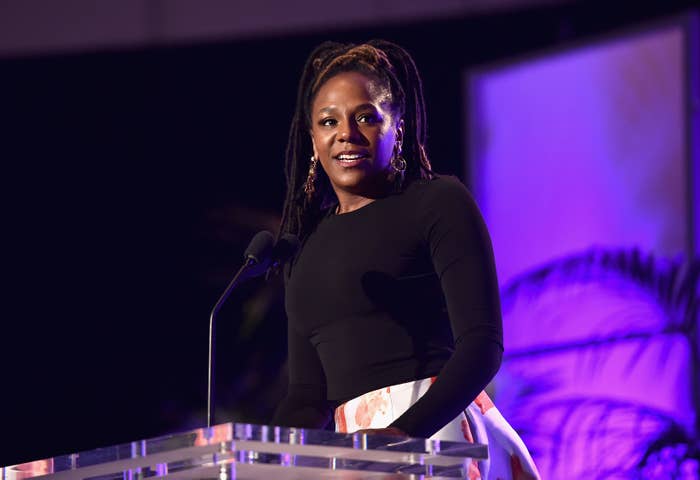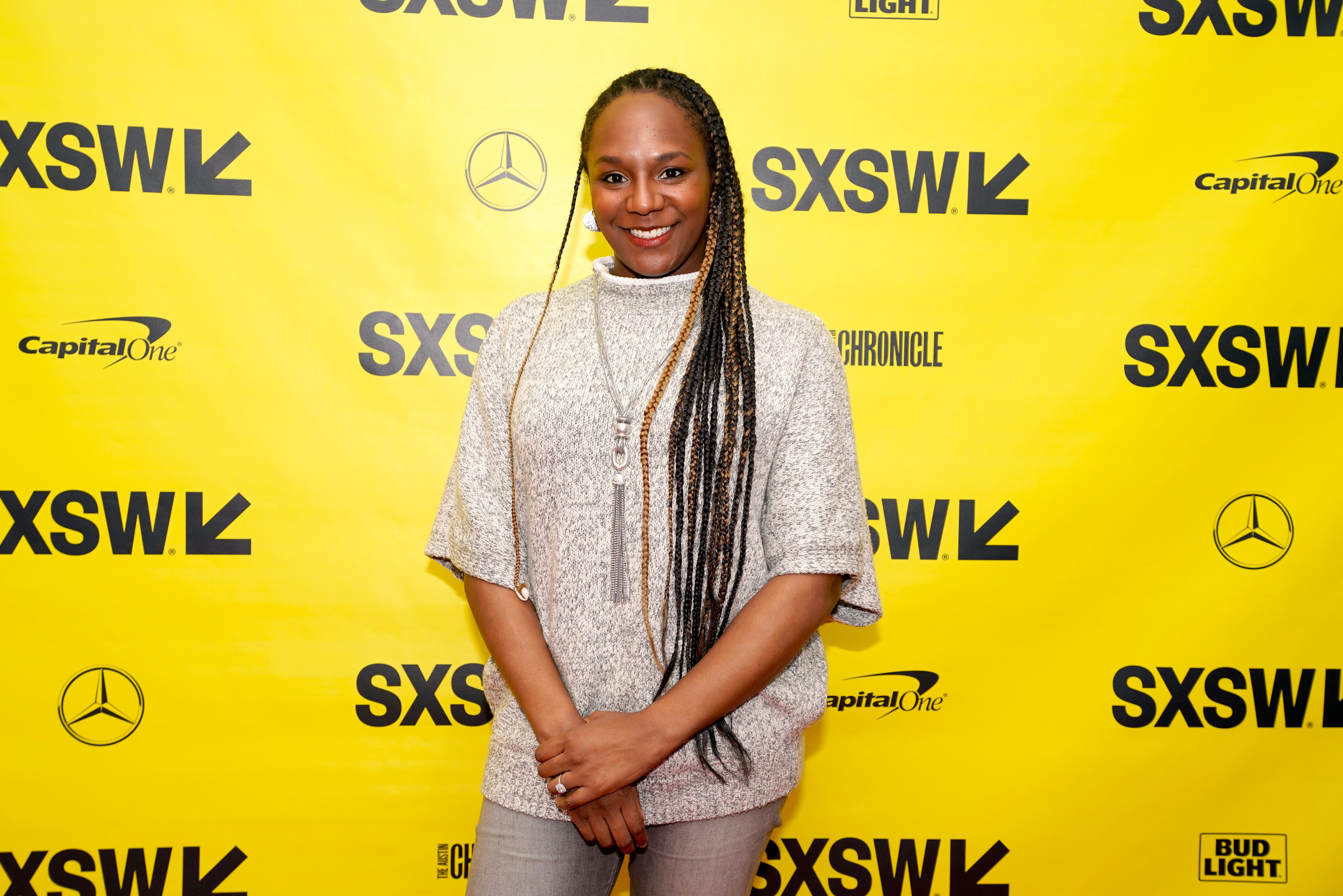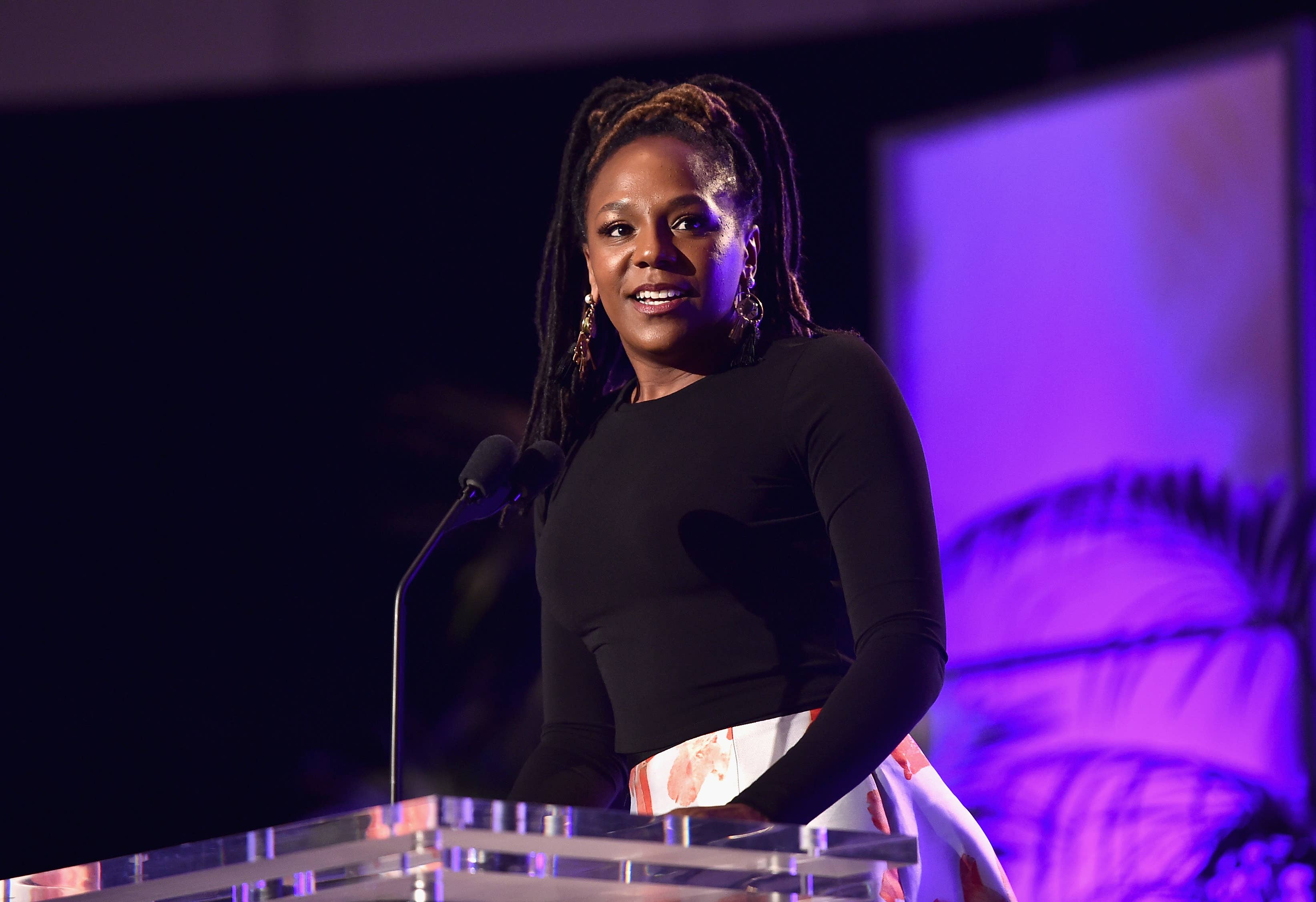
A little over five years have passed since Bree Newsome commanded the nation’s newsfeeds with the insurgent act of stripping the South Carolina State House of its Confederate adornments. Despite a shift in administration, a viral pandemic and media cycles that have wildly accelerated in the wake of record unemployment and quarantine, as Newsome herself does not hesitate to point out, the more things have changed, the more they stay the same. “The system itself is the problem,” she explains. “I don’t think that the existing system can bring solutions because it’s not broken.”
In the time since her arrest, Newsome has remain unbowed, committing to coalition work in her current residence of North Carolina—such as the Housing Justice Coalition in Charlotte and its state-level campaigns such as #NeedAHome2StayAtHome. She continues to use her social and digital platforms to try to effect grassroots disruption. Simultaneously, monuments around the country—Stonewall Jackson in Richmond, Virginia, and Christopher Columbus in Boston, for example—are toppling at a much higher rate than when Newsome initially made headlines. For some, this was a harbinger of an uprising that has yet to fully materialize, while the ever-looming conversation around the November 2020 election casts its shadow over daily protests and steadily increasing unemployment numbers.
While the revolution is being televised and going viral around the world, certain demands remain of major interest to people across the country. At the crux of that lies access to land as a historic means of wealth-building, and housing as a human right that grants, among other things, voting eligibility—a framework that Newsome is tackling head on, saying, “I got focused on housing because it’s one of those issues that touches everybody.”
Complex spoke with the activist and organizer about coalition-building, the destruction of the racist effigies embedded into Americana architecture, and her highest priorities in the coming months as the country struggles to confront one of the worst crises in contemporary history.
This interview has been edited and condensed for clarity.
What does movement work look like for you present day? Everybody's reflection of that is different.
The community of activists in Charlotte have gotten really good at doing rapid-response short-term coalition-building to respond to whatever the government has done. To really go proactive, to really start asserting our own agenda, requires deeper coalition, more sustained organization. That’s how I got involved in housing rights—in the aftermath of the uprising that happened in Charlotte in 2016. Charlotte is like every other major city right now where we have mass displacement going on, gentrification, the cost of living is skyrocketing, wages aren’t keeping up. I'm working at a statewide level in North Carolina, just trying to stop these evictions and utility cut-offs.
The conversation around the need to defund and abolish police is still a new concept for a lot of folks. They still don’t quite understand that concept, like how we could have a society without police forces, but everybody understands that the rent is too high. But of course that intersects with policing all these other issues—that’s what you can bring everybody to the table around.
According to a new Bloomberg statistic, one in four New Yorkers have not paid rent since March because they couldn’t afford to. Regulations in New York are in place where they can’t evict you legally, but they can place [judgments] for back pay. While you can at least stay in the apartment, your credit will ultimately be ruined. Can you speak about that?
None of what you just mentioned is sustainable. We are definitely headed towards a greater crash than what we saw in 2008. You can put one person into bankruptcy. You can't put 40 million people into bankruptcy and not crash the entire financial market.
A major disconnect between the people and the politics is one of the things that the housing crisis has made even clearer. There are millions of people facing eviction right now, and from the way that these politicians are acting around this issue, you would not think they saw the same thing. I think it just shows how this is something that doesn't touch them—they have health care, they have housing, you know what I mean? They’re so disconnected from the reality of how many other people are living, I don’t think that they really recognize just how wide that wealth inequality is. The politicians are generally not able to respond because they’re so disconnected from that experience.
I don’t think we’re going to be able to rely on the mail-in ballot, considering how the Trump administration has a stranglehold on it right now.
Trump admitted that he doesn’t care about USPS, even though mail-in voting has become a priority with the pandemic. Considering everything with regards to trying to maintain housing for people and the criticality of having addresses and the mail-in voting falling into that—how much of a priority should people make the mail-in voting component from a policy and advocacy perspective?
The USPS situation is very serious because we need a national postal service. That’s also just an extension of the whole conservative movement’s attack on public services, period. It’s tied to the elections, but it’s also just about this whole effort to try and privatize everything. That’s why having a systemic analysis is really important—because then you understand the throughline with all of those things and how all of those things are connected.
That said, I don't think we’re going to be able to rely on the mail-in ballot, considering how the Trump administration has a stranglehold on it right now. They’re getting reports of mail being stacked up in certain places, folks are not getting their mail on time—if they’re already able to do that, then who knows what they’ll be to do with these ballots? We should also recognize that the United States Postal Service employs a lot of Black people. I don’t know what it’s like at your post office, but when I go up to my post office, it’s mostly Black women working there. So that’s also really an attack on jobs for us.
According to the Southern Poverty Law Center, this year alone, over 50 monuments [were] removed. In 2019, 16 monuments were removed. Prior to that, it was lower. The numbers are accelerating at a rapid rate, and we’ve seen some of the higher-profile ones on TV—of course yours was done on live TV five years ago. From your perspective, does this need to be highlighted, or do we need to focus more so on the on-the-ground work that people are doing?
We want to be careful, especially as the idea of taking down these monuments becomes more mainstream. The establishment will try to co-opt it and repackage it in a certain kind of way. We have to be careful that we don’t allow them to do that, because what they’ll do is take the monuments down and say, “Oh, we’ve solved racism. Let’s carry on.”
At the same time, the monuments are significant, or else it wouldn’t be such an issue. There wouldn’t be such a showdown over whether or not to take it down. You wouldn’t have people fighting so vehemently to keep these Confederate monuments in place because they do mean something. It’s an ideological battle. There’s a reason why, particularly throughout the South, in front of every county courthouse, you have this same Confederate soldier monument. It’s supposed to send a message that even though the Confederacy lost the war, white power is still the order of the day in the South.
I don’t see a scenario where all of these issues are resolved, we’re on the other side of systemic racism, and we still have monuments of the Confederacy up. Erecting the monuments was part of the colonization process all around the world—a part of the way that they indicated that we are in control and the way to constantly send the message that they’re in control. So that is a part of the process. Taking down monuments to [Christopher] Columbus and these other colonial figures is a part of the decolonization process.

What do you think is different now versus in 2015 that makes the political class even more willing to even entertain the conversation around removing monuments or removing flags?
What happened was Minneapolis rose up and burned a police precinct, [and] that’s what scared them. If you go back to 2015 and how things built up to even when I took the flag down, it was a series of events building upon each other. What happened this time was the Ahmaud Arbery case [happened], and you had some other cases that were brewing in different localities.
On that Memorial Day weekend, you had Amy Cooper, and then right on the heels of that, we had George Floyd. People started protesting. What I think was a key turning point was when they finally arrested the first officer. At that point, the establishment was hoping, “OK, we’ve arrested the officer. Calm down, everybody. Go inside.” That didn’t happen, and it hasn’t happened. People have been protesting since that time, nonstop, consecutively. When that kind of thing starts happening, then they start making concessions.
I think that’s one of the things that we can see now playing out, right? Even now, as the protests have persisted, you don’t see that in the media, as a point of discourse.
Mm-hmm. The other thing I have pointed out is this whole narrative around peaceful protests. When it all first started out, people were peacefully protesting and the cops were tear-gassing them. The establishment was not out in front saying, “Oh, don’t tear gas the protestors.” People started looting, they started burning things down, and then the establishment was, “Oh, no, we embrace peaceful protest.” Their primary concern is always commerce and continuing with capitalism and the status quo, everyday business, and protecting property. That’s always the primary concern above anything else.
We talked about taking down monuments earlier, but what about erecting new monuments? Conversations that activists and the people have a lot of times are about supplanting white supremacist notions with Black excellence. From Kehinde Wiley’s anti-Confederate sculpture (“Rumors of War”) to the discourse about putting Harriet Tubman on the $20 bill—do you have any thoughts on whether or not we should go out of our way to build monuments to our Black American historical figures?
I actually saw that Kehinde Wiley piece when it was in Times Square. I thought it was a really powerful statement. At the same time, I do think that there is something really valid about these critiques about replacing white everything with Black people. What does it mean to take the same types of monuments that white people have created and replace them with Black people? Are we really going deep enough in terms of critiquing and dismantling the system? Or are we just trying to replace white emperors with Black emperors?
There’s power in naming our heroes and lifting them up. We don’t have many monuments to Black people or women—especially Black women—like, anywhere. If it weren’t significant, then it wouldn’t be an issue, right? I remember when people were like, “Oh, don’t just put Harriet Tubman on the $20 bill—what is that doing? How does that address capitalism?” That’s true, but at the same time, if it didn’t have any power, then they wouldn’t have any problem with doing it. The reason that they don’t do that is because they don’t want people thinking about this revolutionary figure. Imagine if every time you saw a $20 bill, you saw Harriet Tubman and you’re reminded of slavery. You’re reminded of how we’re still struggling.
There’s value in it, but I don’t want us to over-prioritize that above addressing the material conditions of our people—because, again, what the establishment will do is say, “OK, yeah, we’re going to take down a Columbus statue, put up a Harriet Tubman statue, take down this statue, put up a Frederick Douglass statue,” [and] that will become the project while people are still homeless. People are still not going to have living wages, and that [ends up] becoming the new neoliberal project.
What happened was Minneapolis rose up and burned a police precinct, [and] that’s what scared them.
We’re in this space where there’s such a small slice of the historical canon dedicated to Black history within American history. What’s the ethical way to declare more space without just feeding the wheels of empire?
We can think outside of the box more. Instead of creating a monument, what if it’s a park that has fruit trees and we name that after a Black [historical] figure. Instead of it being a monument to somebody, instead of it being this stone thing that looks exactly like what the colonizers built, it’s something that is more reflective of our culture.
They just renamed a road in Chicago after Ida B. Wells, [and] that’s powerful. You see that, and you’re like, “Well, who’s Ida B. Wells?” If you didn’t know, you’re going to learn. It’s going to be a reminder of that history.
Don’t forget that you can do your part by visiting Complex's Pull Up & Vote site—where you can double-check your registration, register to vote if you haven’t, and request a mail-in ballot.

